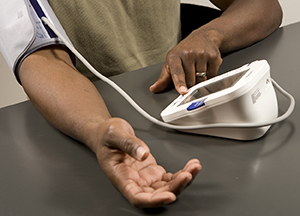Health Library
Stay on top of your health and access your source of healthcare updates, wellness tips, and insightful information that will empower you to feel better.
Checking Your Blood Pressure at Home
Keeping track of your blood pressure at home can be a good way for you and your healthcare provider to learn how your blood pressure changes during the day. You can use one of two types of blood pressure monitors. Each has pros and cons.
Aneroid monitors
This type of monitor has a cuff that you inflate by hand and a dial gauge with a pointer. Most models are easy to carry. They are often inexpensive. Some models have easy-to-read gauges and a special cuff that lets you work it with one hand. These monitors need to be adjusted at least once a year. These are very accurate but can be hard to read.
Digital monitors
These monitors are easy to use and read. Most digital monitors are portable and can be used with one hand. Keep in mind that digital monitors are sensitive to body movement. They don't work well on certain people. They also need electricity or batteries and are more expensive than aneroid monitors.
Talk with your healthcare provider about which type might be best for you. No matter what kind of monitor you use, take it with you to your provider's office. You can compare it with the monitor in the office and check that it is accurate.
Tips for buying a blood pressure monitor
The American Heart Association (AHA) recommends an automatic monitor that uses a cuff that goes on your upper arm (bicep).
The AHA doesn't recommend wrist and finger monitors. This is because their results are not as reliable as the upper arm monitors.
Check that the monitor meets the U.S. Blood Pressure Validated Device Listing criteria. See www.validatebp.org for more information.
Check that the monitor is approved for children, pregnant women, and older adults if it's to be used for these groups.
People with smaller or larger arms may need a special cuff size. Measure around the upper arm. Choose a monitor that comes with the correct cuff size.
Check your monitor's reading with your healthcare provider's reading when the device is new. Check it once a year after that.
Monitors can wear out over time. They may no longer be able to be adjusted. You may have to replace your monitor if the measurements are very different from the measurements made at your provider's office.
Online Sources
Meet our Doctors


Friday, 09:00 AM - 12:00 PM
See More

Friday, 01:00 PM - 05:00 PM
See More

See More
See More
Related Services
10% KOH
10% KOH SMEAR
17 OHP (17 HYDROXYPROGESTERONE)
Topics
- Adolescent Medicine
- Alcohol and Drugs
- Allergy
- Asthma
- Bariatrics
- Bone Cancer
- Brain Cancer
- Breast Cancer
- Breast Health
- Burns
- Cardiac Electrophysiology
- Cardiology
- Cardiothoracic Surgery
- Colorectal Cancer
- Colorectal Conditions
- Complementary Medicine
- Craniofacial
- Dermatology
- Diabetes
- Emergency Medicine
- Endocrinology
- Environmental Medicine
- Gastroenterology
- Genetics
- Geriatrics
- GI Cancer
- Glossary
- Gyn Oncology
- Gynecology
- Hand Surgery
- Hematology
- Hepatology
- Home Health
- Hospice
- Immunology
- Infectious Disease
- Interventional Cardiology
- Journey Stage
- Lab Tests
- Lactation
- Lung Cancer
- Men's Health
- Mental Health
- Navigating Healthcare
- Neonatology
- Nephrology
- Neurology
- Neurosurgery
- Nuclear Medicine
- Nutrition
- Obstetrics
- Oncology
- Ophthalmology
- Oral Health
- Orthopaedics
- Otolaryngology
- Pain Management
- Pathology
- Pediatrics
- Perinatology
- Physical Medicine and Rehabilitation
- Plastic Surgery
- Prostate Cancer
- Prostate Health
- Psychiatry and Behavioral Health
- Pulmonary
- Radiology
- Rehabilitation
- Reproductive Medicine
- Rheumatology
- Safety
- Skin Cancer
- Sleep Disorders
- Spine
- Sports Medicine
- Stroke
- Surgery
- Terminal Illness
- Therapeutic Radiology
- Transplantation
- Travel Medicine
- Urologic Cancer
- Urology
- Vascular
- Wellness
- Women's Health
- Wound Care












